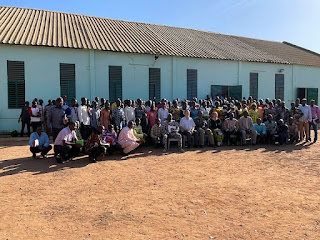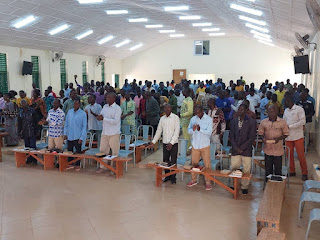We are now in Cameroon, teaching the DML Economics of Hope course to some key DML leaders from both Anglophone and Francophone areas. Cameroon is in its sixth year of civil war between the Anglophone and Francophone regions. The government refuses to negotiate, calling the Anglophones "terrorists" and the citizens on the Anglophone region (20% of the population) continue to have significant struggles. Hundreds of thousands are in Internally Displace Persons camps, or have fled to neighboring countries, or shelter in place in fear. The weariness of a six-year conflict can be seen in the faces. Those I met in 2017 from that area are fatigued, stressed, and losing hope.
[The only "good" thing that I have heard come out of this so far is that the Ambazonian fighters (as they are called) are requiring everyone in that area to "strike" on Monday in protest of the situation. If one dared to open their business, it would be torched. No one dares to go outside on Mondays, and parents have said that the whole family is under the same roof for an entire day which has caused them to grow closer!]
It's a good time to teach the Economics of Hope. Hope is critical to finding a way forward for everyone. We get up, we work, we take action because we have hope that there can be a result from our efforts. My experience in working with people in poverty for 25 years is that there is often a significant loss of hope in the heart. Our goal is first to affirm everyone's primary calling, including that of Jesus (John 12:27-28), which is to glorify God. By affirming this, we begin to lift our eyes from our current situation to something much bigger. Then we move to how to glorify God - we understand God to be a working, creative God who has given us the call as image bearers to work and be creative as well (Genesis 1:28 and 2:15). We study how economics works - government, education, and the church are there to support those in business, but primarily wealth creation (which is the opposite of poverty alleviation) are going to come from businesses.

We need to ask, "What is in our hand?" We find this type of question many times in the Bible.
It is the question that Elisha asked the poor widow. In 2 Kings 4:1-7, Elisha asks, "What do you have in your house?" Then he tells her to go and leverage her relationships with neighbors for jars. He started with her oil and her relationships.
In Mark 6, we read the story of Jesus feeding the 5000 with a few loaves and fishes. But his first statements to the disciples, when they raised the issue of people being hungry, was, "You give them something to eat." They protested. Then Jesus said, "How many loaves do you have? Go and see." He didn't try to solve the problem FOR them. He tried to solve the problem WITH them.
The difference between "for" and "with" is where we spend a lot of time. "Shut up and listen" is what we need to do!
Much of poverty alleviation is building capacity. Breaking down poverty relating not just economics, but relational poverty, educational poverty, spiritual poverty, social poverty, and more. Social poverty is a very large factor of poverty in Africa, as entire genders, tribes, or people groups are not given equal/fair access to the very things that will allow them to develop their own capacity.
And so, we emphasize that the opposite of poverty is NOT wealth. It is justice. As justice is being sought, we need to work on helping every person see their own capacity, as image bearers of a working, creative God.
On Tuesday, we leave for Burkina Faso. We ask for your prayers for both Cameroon and Burkina Faso, where so many people are dealing with conflicts in these countries. May God heal our lands!














